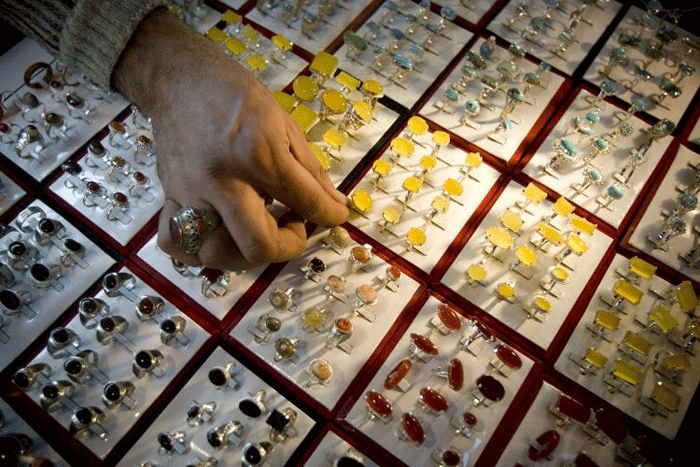You need more than priceless gems to make it in the jewellery trade

It was all right for Peter Carl Fabergé. He just whacked out an egg every year for the Russian royal family and spent the fat profits on caviar. But in an increasingly mass-produced world, how do today's jewellers make a living?
Manchester-based Tracey Birchwood has been producing jewellery for 10 years and works out of the city's Craft & Design Centre. "Since I was a child, I have always been into making things; I would spend hours designing and making my own clothes," she says. "When I applied to university, I wanted to have a go at several disciplines, so I chose a course that offered lots of different mediums."
She studied 3-D design at the University of Brighton, and majored in ceramics and plastics. "Most of my degree show featured vases, decanters, goblets and perfume bottles, all intricately embellished with textures," she says.
A year after finishing university, she set up her own studio. Two years later, she found herself drawn to making much smaller items, and developed a range of "bobbly porcelain" jewellery. This gave her the confidence to develop new ranges, which now include a porcelain-and-wrapped-wire collection and also a recent addition of silver and semi-precious beaded and tassled jewellery.
"Working as a jewellery designer is difficult to begin with, and it's good to have a network of people around," she says. "I have been making jewellery for about 10 years and I'm earning a living. But over the years, I have had to do other part-time jobs as well."
Birchwood sells her work through galleries, jewellery and gift shops and mail order via her own catalogue. She also exhibits at contemporary craft fairs.
As with any business, there are ups and downs. "You have to work very long hours at times and be extremely dedicated, but it's rewarding when you first make something new and different and a customer loves it."
It is possible to get rich, too, says Nik Stanbury, if you can identify where you want to go with it. "You can make a lot of money very quickly if you have a "widget" – something that you can pile high and sell cheap, like reclaimed jewellery, which is very popular at the moment," he says. But if you want to create works of art, you need a great deal more craft. "If you want to manufacture jewellery, you need a new, different set of skills," he says.
Stanbury is the founder of the York School of Jewellery. He went into jewellery-making after studying foundation art and design at Cardiff College of Art and 3-D design at Middlesex Polytechnic. "I went there to be a furniture designer," he says. "But I had to do silversmithing and ceramics, too. As soon as I started silversmithing, I thought it was the best thing since sliced bread." A PhD at the Victoria & Albert Museum in Japanese shakudo and shibuichi alloys followed. "I had always been interested in Japanese things," he says.
Stanbury started his jewellery school because he felt that local and national courses and classes in the subject varied wildly in quality. The school's courses comprise a maximum of six people per class. "Someone could be learning diamond-setting at the same time as a complete beginner," he says.
Television programmes such as Changing Rooms have done a lot to promote design in general, he believes, but not always positively. "To really make jewellery, you need to complete a very good course and learn your craft properly. But, of course, it's not a science, and there are people who run successful businesses with no knowledge at all. But there is an ocean between Fabergé and a bead-stringer."
How to shine like a diamond
Do you require a qualification? And if so, why? Nik Stanbury says that degrees and other qualifications mean nothing in a professional environment: you will be judged solely on the quality of your work. However, a degree course should allow you full-time access to workshops and facilities, which are ideal environments for developing skills more quickly. Find and enrol on a good course that will teach you the basics. Alternatively, work alongside a professional jewellery designer and learn on the job.
York School of Jewellery ( www.york-school-of-jewellery.co.uk) runs courses that teach both essential skills and advanced design and practice. The British Jewellers' Association ( www.bja.org.uk) has details of events and courses on its website and runs a quarterly newsletter. HS Walsh (www.hswalsh.com) is the leading supplier of jewellery equipment in the UK and also lists details of training courses.
Useful links: Manchester Craft & Design Centre ( www.craftanddesign.com)
The University College for the Creative Arts in Farnham, Surrey, runs a BA (Hons) in 3-D design, focusing on ceramics, glass, metalwork, and metalwork and jewellery ( www.ucreative.ac.uk)
Central Saint Martins College of Art and Design runs a BA (Hons) in jewellery design ( courses.csm.arts.ac.uk)
Join our commenting forum
Join thought-provoking conversations, follow other Independent readers and see their replies
Comments
Bookmark popover
Removed from bookmarks